
The path from high school varsity bowling to professional ultimate frisbee surely can’t be very well-traveled. Especially in Minnesota, where outdoor conditions can be, as some locals tell themselves, “refreshing.”
Ben Feldman took that very path all the way to the Ultimate Frisbee Association (UFA) championship tournament in Salt Lake City this year, where his Minnesota Wind Chill team upset the Carolina Flyers to bring home the state’s first professional men’s championship since the ’91 Twins.
The suburban Minneapolis native wasn’t always part of the ultimate frisbee community, and the Wind Chill wasn’t always a pro team. You might say they evolved and matured together, and now they’ve helped to expand the sport and fan base across the state.
Growing up, Ben played team sports, ran track, and in high school, found his way to the bowling team. Hopkins High School had an ultimate frisbee club team, but Ben didn’t play in part because players would go to a sports camp in Wisconsin every summer, and that was out of reach.
He had good friends on that team, though, and one of them approached him after bowling practice one day. Tryouts are coming up. The friend said you should come. Ben went and remembers being “terrible but decently athletic.”
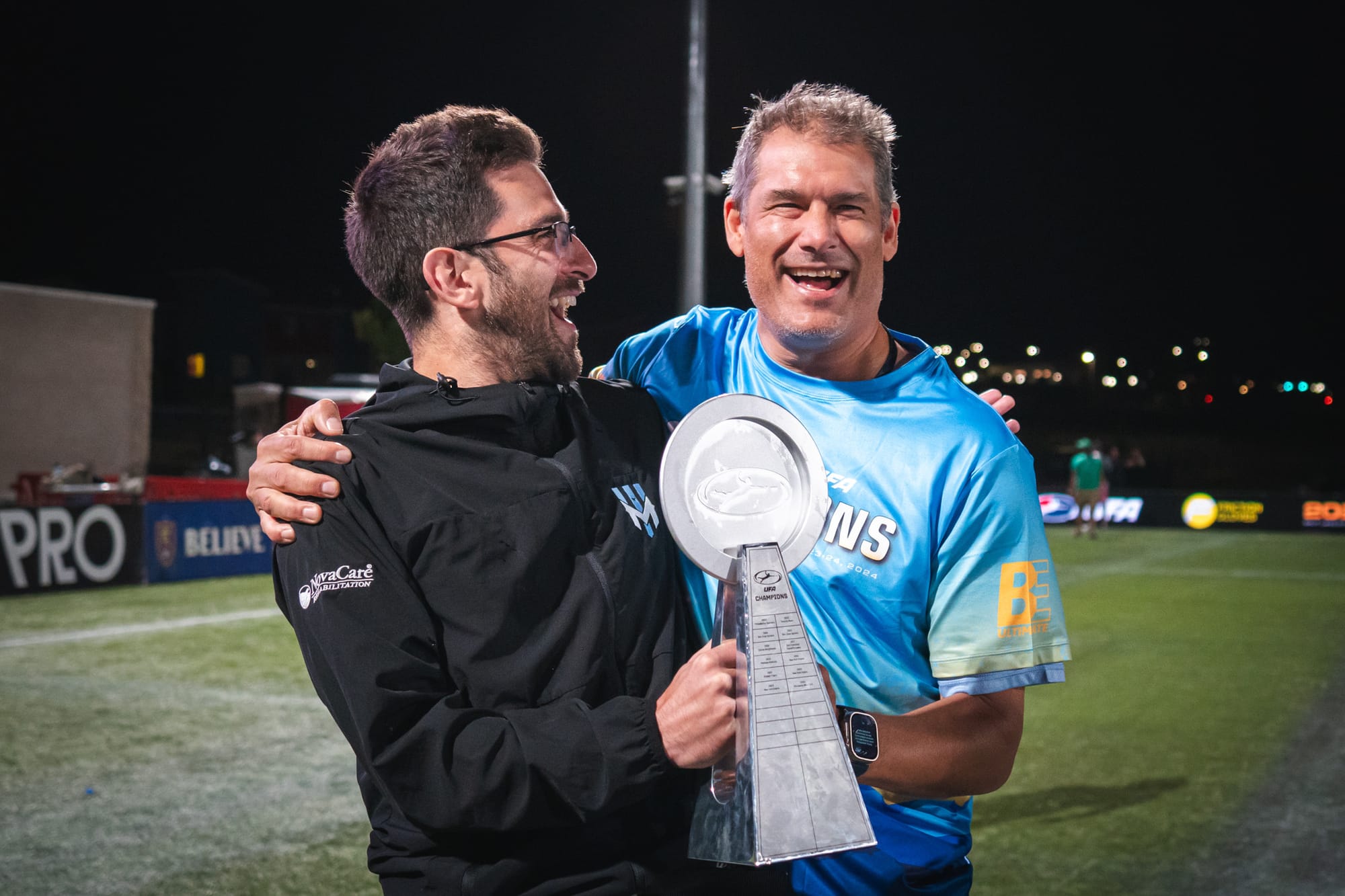
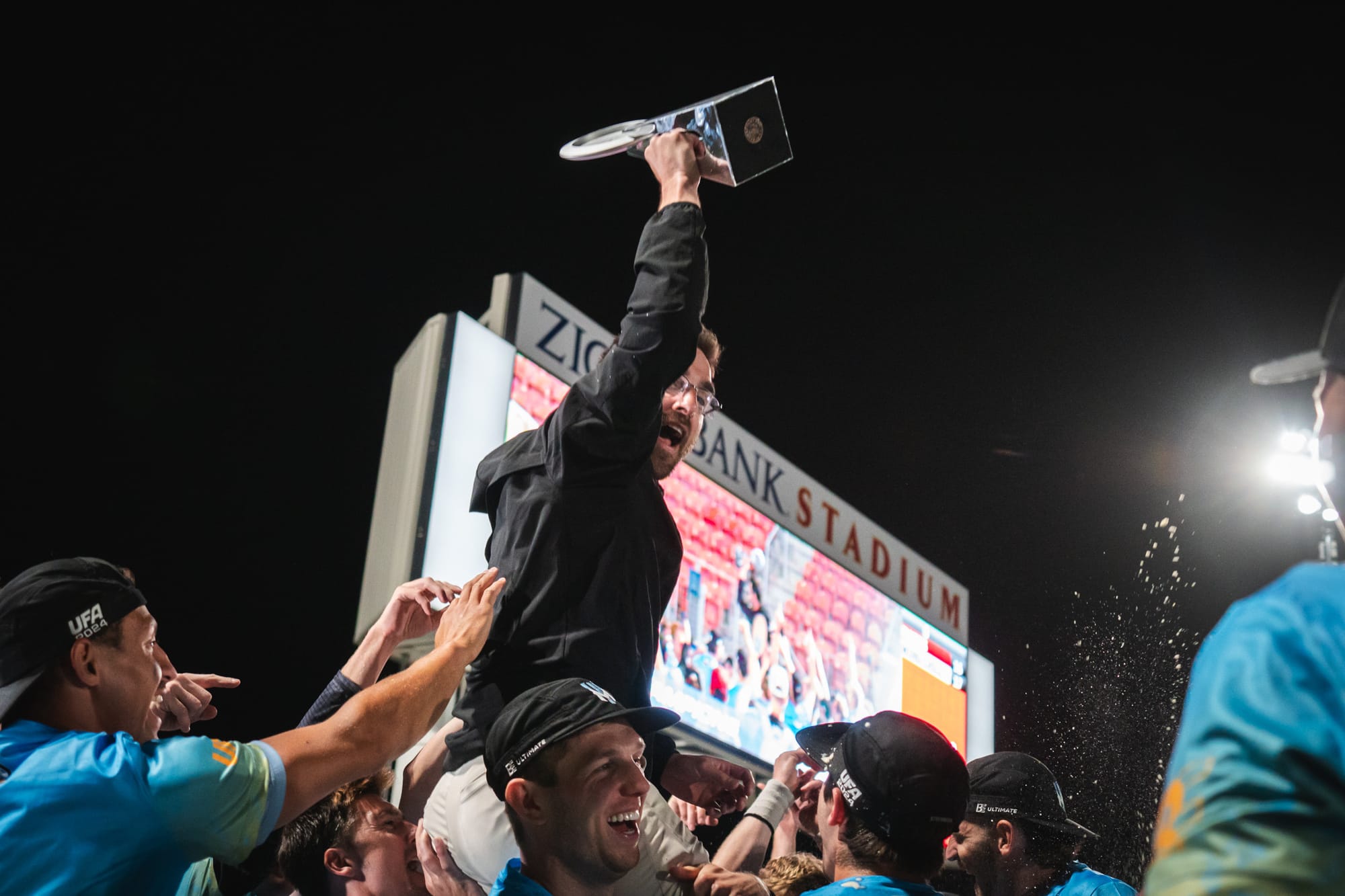
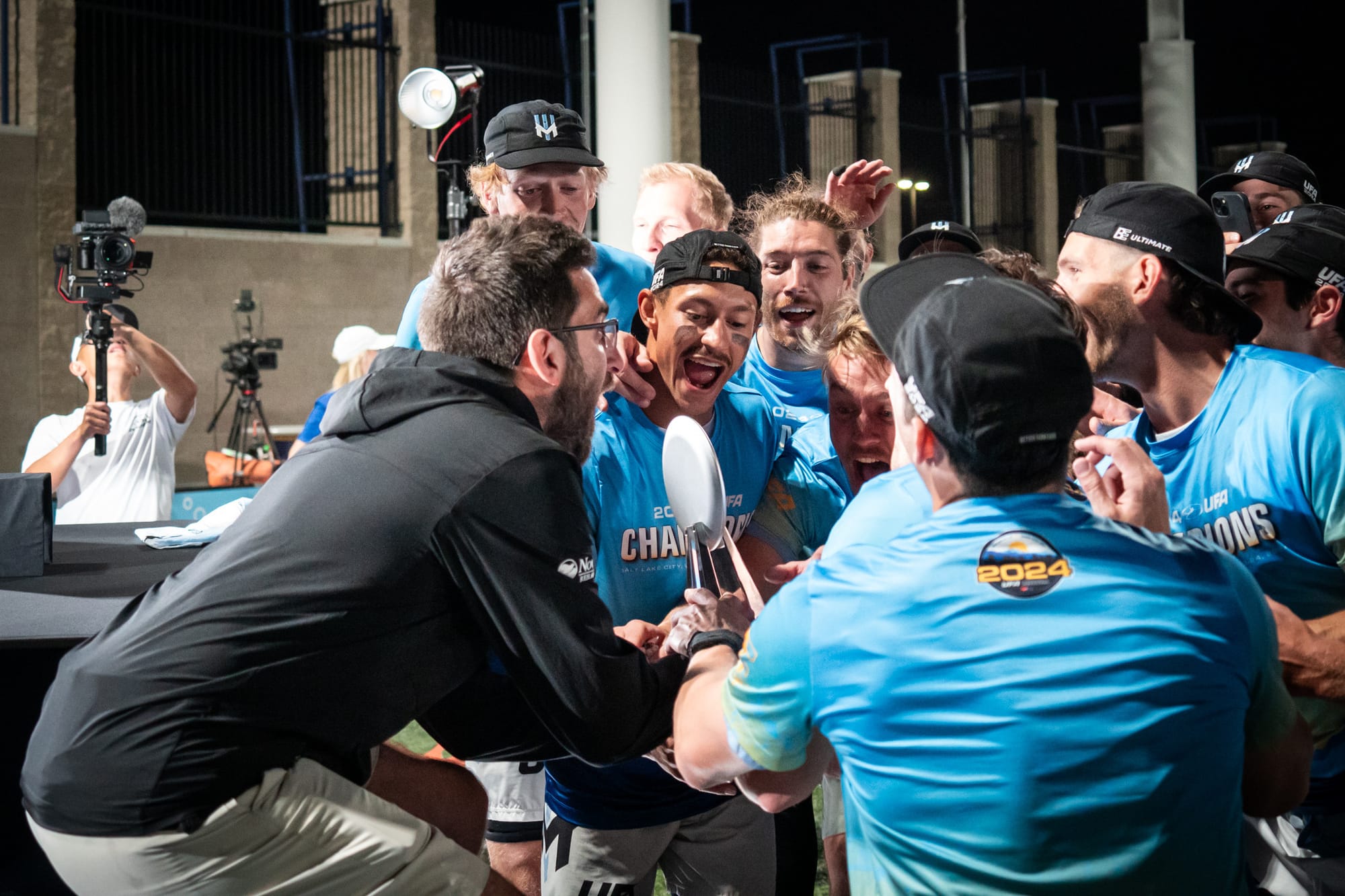
Ben Feldman, minority owner, general manager, and coach of the Minnesota Wind Chill, leads the team to their first UFA championship in Salt Lake City. [Courtesy photos]
“I wasn’t able to throw a forehand, but I remember running around and feeling like I was pretty fast. I remember scoring a goal at that first practice, sliding and catching a goal, and thinking, ‘This is the coolest thing.’”
Not only was it fun — like football or rugby except advancing and scoring only through passing — but it had a culture like no other sport. At most levels of competition, there are no referees. Instead, players self-officiate, so integrity, personal responsibility and conflict resolution are bedrock. The code even has a name: Spirit of the Game.
Players are expected to know and enforce the rules of the game, even when it’s not in their team’s favor. The principle is so ingrained that players still apply it at the pro level, where there actually are referees.
“Players self-officiate for so long, you still see guys coming out with raised hands to self-officiate,” Ben says. “It’s about integrity. We’ve made an integrity call to lose a game.”
Let that sink in for a minute.
Ben got pretty good by his senior year and was thrilled when he learned that his top college choice, the University of Wisconsin–Madison, had a top-tier ultimate frisbee team with roots dating back to 1977. The team became known as the Wisconsin Hodags in 1994, and when Ben joined in 2006, he found whole new levels of competition, commitment and die-hard ethos.
A Hodag is, after all, a "ferocious beast" living in the Northwoods of Wisconsin, as the team website says, and “while the warm weather squads rest on their sunny laurels, the Hodag is gritting its teeth and sharpening its claws.”
His freshman year was focused on development during the regular season, but he did play one point during the Hodags’ national championship win against Colorado that year. He had a much bigger role the following year when the team beat Florida for another national championship. (This documentary captures that journey.)
An ACL tear sidelined him for a stretch in the winter of 2009, but he rehabbed like mad to make it back for the national tournament—a huge victory for him even though the team had a rough showing. The following year, when he was a fifth-year senior, the team made it back to the national championship game against Carlton College.
“We were the ninth seed going in, going up against our division rivals who we’d beat at regionals but ended up losing 11–6 in 30-to-50 mile-an-hour winds. I don’t ever want to watch that game.”
Beyond playing in college, Ben was in business school, and his entrepreneurial spirit got him thinking: It would be cool to do youth camps, help offer kids opportunities to learn, love and grow the game. Most ultimate frisbee camps were out east, so together with a partner, Ben designed overnight youth camps in Madison and Portland.

Another big project: organizing a college tournament that would serve as a fundraiser to help support Hodag travel and other expenses. That tournament, No Wisconsequences, is still going strong with as many as 80 teams now participating each year.
“It was the beginning of my event management experience. Just managing a budget, finding sponsors, renting fields, designing merchandise, I learned a lot, and it probably helped build the success for being a general manager.”
And not just a general manager, but also now a minority owner and coach of the Wind Chill.
After college, he returned to Minnesota for a consulting job and continued playing at the club level, just as he had during college offseasons. When the Wind Chill became a 2013 expansion team in what was then the American Ultimate Disc League (AUDL), Ben played on and off for four years before transitioning to a general manager role. At that point, the team owner had decided to move on, so Ben stepped up to run the team while the league looked for a new owner.
“With my event planning and background, it was a good fit.”
Ben put together a presentation to try and rally sponsorship dollars from local businesses, among them Surly Brewing, a Minneapolis-based craft brewery already active in the local ultimate frisbee scene.
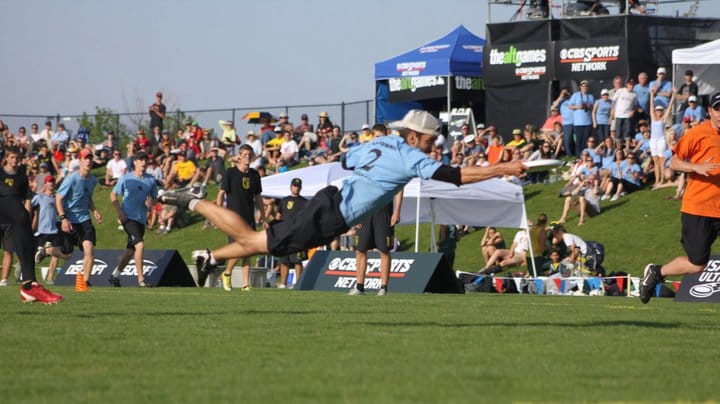
Surly ran (and still does) men’s teams in the Masters, Grand Masters, and Great Grand Masters divisions and women’s teams in the Masters and Grand Masters USAU divisions. With such built-in affinity, Ben figured he’d approach Surly owner Omar Ansari for a hefty sponsorship.
“He’d always been good about financial support, providing beer and things, because of how deeply embedded he was in the sport already. So I was like, ‘I gotta get Omar involved.’ I presented my big sponsorship deck, and he said, ‘How much to just buy it?’”
And he did. Ansari became majority owner in 2017, and Ben is a minority owner, general manager and coach.
The team has been making strides ever since. As part of the 24-team professional Ultimate Frisbee Association (rebranded from the AUDL earlier this year), the Wind Chill practices and plays at Sea Foam Stadium, a winter-domed facility for football, women’s soccer and other sports at Concordia University in St. Paul.

In 2023, the Wind Chill made it to the UFA Championship Weekend for the first time in franchise history. And with the tournament taking place at the Minnesota Vikings’ practice facility, Ben and the team had high hopes of winning it all in front of a hometown crowd after losing in the division championships the previous two years.
It wasn’t to be. The Wind Chill lost to the Salt Lake Shred in overtime in the semis.
“It was a depressing way to lose, heartbreaking,” Ben says. “But we created a lot of fans with that heartbreak. The sting definitely lingered.”
And just like the event organizing experiences of his college days, those losses helped set the stage for Wind Chill glory at the championship tournament in Salt Lake City in August. They were the underdog seed coming into characteristically wild Wasatch Front winds.
Wind is a huge part of strategy and execution in every outdoor game. The DC Breeze were supposed to beat them easily in the semis, but Ben opted for an aggressive approach that capitalized on everyone’s low expectations of them.
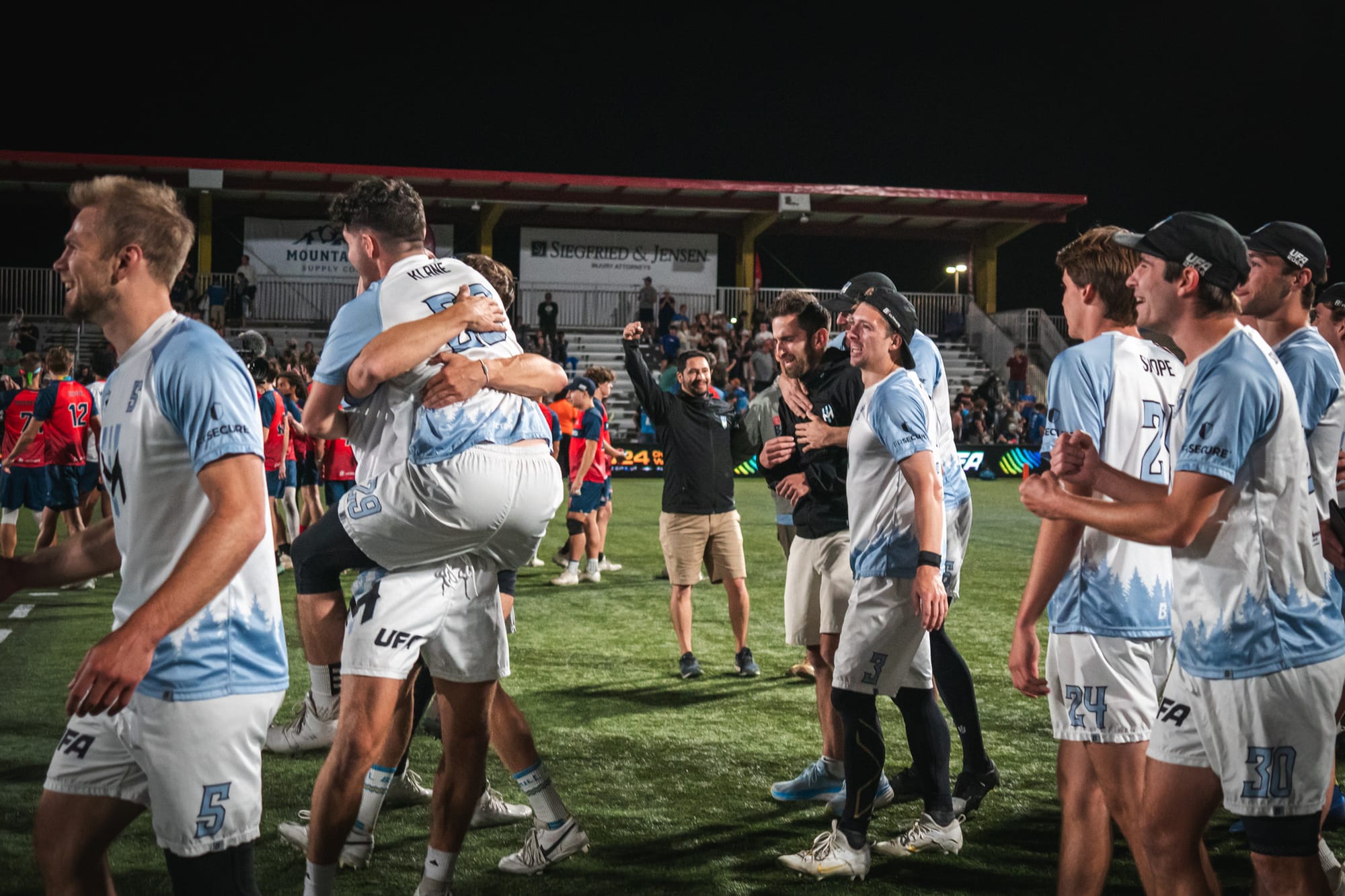
“We were playing the most talented and efficient team in league history, and the whole conversation was about them playing in the wind. It was so obnoxiously windy, which we knew actually favored us.
“There are more turnovers in the wind, and just understanding how to manage those conditions, you’ve gotta be willing to take bigger risks, and it’s a lot easier to be an underdog in that scenario.”
And that was that. The Wind Chill went on to beat the Breeze, defeated the Carolina Flyers in the finals, and celebrated with the UFA Championship Weekend trophy.
“It’s big for our state, pretty special and still a little bit surreal, but it wasn’t a fluke. We’re gonna get back again.”
Preparing for the 2025 season is already underway. Free agency began in September, and tryouts are in January. Most of the guys on the Wind Chill roster are Minnesotans, but Ben says the team will fly in top-five talent for games. This year, the team had players from Winnipeg, St. Louis and Des Moines.
He manages all of this while also raising a young family, running his own insurance business and using those event-planning skills to continue attracting sponsorships, in-person attendance and subscriptions to watch games on UFA.tv.
All for the love of the game.
“The goal is not having this be a cash cow but to invest every dollar back in to make the team better and win and grow.”
